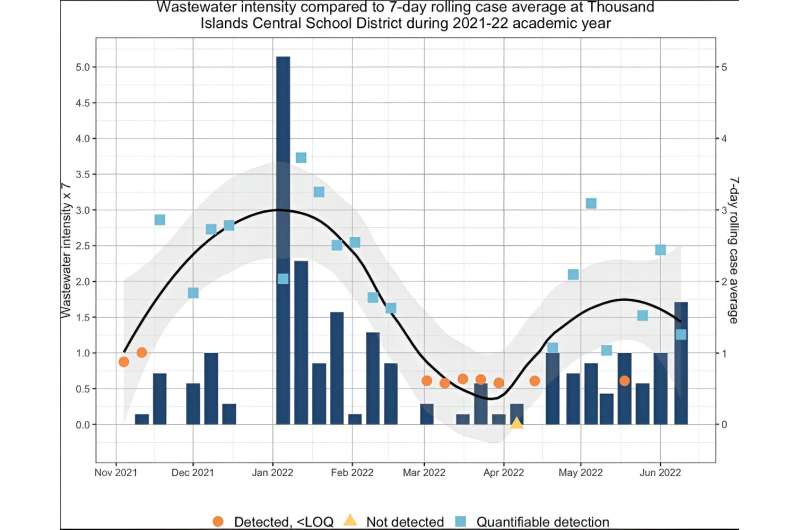This article has been reviewed according to Science X's editorial process and policies. Editors have highlighted the following attributes while ensuring the content's credibility:
fact-checked
peer-reviewed publication
trusted source
proofread
Study reveals wastewater surveillance is key tool in keeping schools open during public health emergencies

Wastewater surveillance is a potent tool in understanding COVID-19 transmission within school settings, according to a groundbreaking study led by epidemiologist David Larsen from Syracuse University.
The research team's work published in PLOS Global Public Health establishes the pivotal role of wastewater analysis in managing the public health response to COVID-19 at schools.
The study focused on a middle and high school campus in Jefferson County, New York, serving 600 students and compared results from wastewater surveillance to COVID-19 case trends. The surveillance demonstrated high levels of sensitivity, positive predictive value (PPV), and negative predictive value (NPV) in wastewater surveillance. While the specificity of wastewater surveillance at the school was observed to be lower, the strong correlation between the amount of SARS-CoV-2 RNA recovered in wastewater and COVID-19 cases highlighted its potential in understanding transmission risk within the school.
"By analyzing wastewater samples, we observed a robust correlation between SARS-CoV-2 RNA levels and the number of confirmed COVID-19 cases within the school, providing critical insights into potential transmission," says research team member Haley Kappus-Kron, an epidemiologist at the CDC Foundation.
The published study acknowledges the limitations of a one-day lead time of wastewater surveillance to predict clinical COVID-19 cases.
"The practicality of wastewater surveillance as an early warning tool heavily relies on timely reporting and swift actions following a positive sample," says Kappus-Kron. "Nevertheless, in the absence of mass asymptomatic testing, wastewater surveillance presents an appealing and cost-effective approach to understand disease trends within school environments."
While wastewater surveillance would not prevent all transmission, its role in understanding the extent of transmission could be critical in ensuring schools stay open as much as possible during a public health emergency due to an infectious disease. Applying wastewater surveillance in schools could potentially prevent unnecessary school closures and keep children in school longer.
"Wastewater surveillance will probably work for most infectious diseases, including the next public health emergency threat. With wastewater surveillance in schools, we may be able to keep the schools open longer and respond specifically to outbreaks rather than implement broad closures," says Larsen, Professor and Chair of the Department of Public Health at Syracuse University's Falk College of Sport and Human Dynamics who at outset of COVID in 2020 led an interdisciplinary team of experts in coordination with the New York State Department of Health to create a wastewater surveillance system throughout New York State.
As the world moves beyond the COVID-19 pandemic, schools may consider integrating wastewater surveillance into their emergency preparedness plans. The study advocates for school-specific plans that include access points, laboratory contacts, and protocols for effective wastewater sampling and analysis, especially during public health emergencies.
More information: Haley Kappus-Kron et al, Precision public health in schools enabled by wastewater surveillance: A case study of COVID-19 in an Upstate New York middle-high school campus during the 2021–2022 academic year, PLOS Global Public Health (2024). DOI: 10.1371/journal.pgph.0001803





















